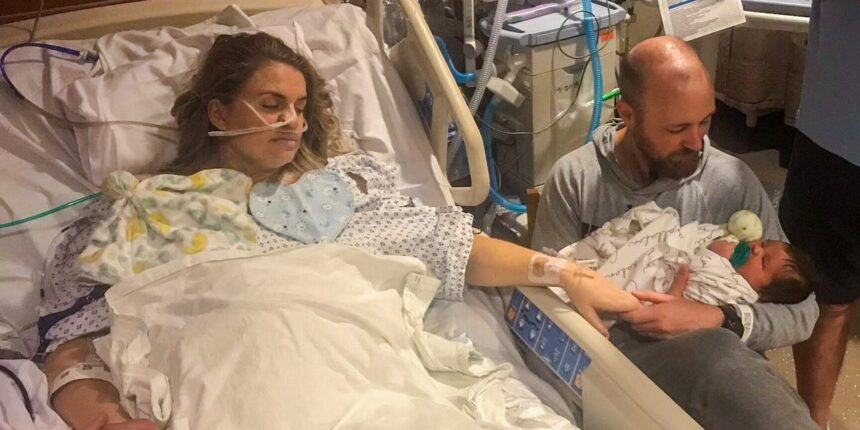“`html
Image courtesy of Kayleigh Summers
- Kayleigh Summers, 34, experienced an amniotic fluid embolism leading to heart and lung failure.
- Her son was delivered via emergency cesarean section just six minutes after she lost consciousness.
- Although she spent two weeks in the hospital, it took years for her to fully process the trauma.
This narrative is based on a discussion with Kayleigh Summers, founder of The Birth Trauma Mama. The content has been edited for brevity and clarity.
I have no recollection of the day I gave birth to my son, Callahan. However, through conversations with my husband and medical team, along with reviewing over 6,000 pages of medical documentation, I’ve managed to reconstruct that harrowing experience when I nearly lost my life.
Callahan was my first child. At 40 weeks and two days into my pregnancy, I was induced due to elevated blood pressure levels. The induction process was typical for a first-time mother; however, after two and a half days of laboring slowly, I finally reached the point where I could begin pushing.
I informed the nurse that something felt off; she attributed it to common nausea associated with labor transition. Moments later, I began screaming that there was an issue with my heart before losing consciousness entirely. My heart had stopped beating and breathing ceased as well.
Rapid Resuscitation Amidst Crisis
As doctors worked on delivering Callahan safely into the world during this critical moment, another team focused on reviving me since I remained unresponsive. Although Callahan entered this world not breathing initially, he quickly stabilized thanks to prompt medical intervention. Meanwhile, doctors conveyed distressing news: “The baby is fine; however Kayleigh is not.”
The medical team successfully restarted my heart only for it to stop again shortly thereafter. My obstetrician identified that I was suffering from an amniotic fluid embolism, which occurs when amniotic fluid enters a mother’s bloodstream causing severe complications such as cardiac arrest and significant bleeding—resulting in me requiring 143 units of blood transfusions.
I found myself placed on life support before being transferred to another facility where doctors proposed one last desperate measure: utilizing an Impella heart pump. Fortunately for me—and within just 24 hours—I began showing signs of recovery sufficient enough to start weaning off life support systems.
Erased Memories: A Protective Mechanism?
I met Callahan five days post-delivery; upon seeing him for the first time all I could think was “this isn’t my baby.” My mind struggled immensely processing everything that transpired around his birth—my last clear memory being from getting a manicure just prior on Friday before his arrival Wednesday afternoon.
When regaining consciousness post-surgery there were no recollections whatsoever regarding prenatal visits or preparations—it felt as if all memories related directly or indirectly were wiped clean by some protective mechanism within me.
While medically perplexing at best given circumstances surrounding trauma recovery—as someone trained professionally in mental health—I recognized instinctively how vital such mechanisms can be during traumatic experiences like mine!
Diving deeper into recovery revealed conflicting emotions between personal feelings versus professional insights regarding childbirth trauma’s impact upon parenting dynamics overall! Many individuals facing similar situations often do not survive yet here stood gratefulness alive alongside overwhelming challenges ahead! During hospitalization periods discussions arose about therapy needs among family members who also endured emotional turmoil stemming from these events (and they indeed sought help).
Challenges in Bonding With My Newborn Son
I left the hospital when Callahan turned two weeks old but found myself mentally drained beyond belief—leading me disinterested towards nurturing him properly despite familial encouragements urging feeding attempts which felt obligatory rather than enjoyable at times.
Reflectively speaking now those moments did contribute towards bonding albeit differently than envisioned postpartum experiences would typically unfold causing considerable emotional distress back then!
Around six months following his birth journey began sharing openly about what transpired leading up until today specializing specifically within perinatal trauma treatment realms! Not every traumatic experience mirrors mine precisely yet each bears potential ramifications affecting parent-child relationships profoundly needing spaces created fostering open dialogues without fear judgment attached!
Living With Grief Over Being An Only Child Parent
Fast forward five years later today—Callahan remains our sole child—a reality still difficult accepting given circumstances surrounding his entry into this world including undergoing emergency hysterectomy during delivery itself! Not only did death almost claim me but robbed future opportunities experiencing milestones like hearing cries anew or cherishing golden hour moments shared amongst siblings alike…
This grief lingers eternally yet gradually finding peace amidst acceptance realizing family structure feels complete even if different than originally imagined!






